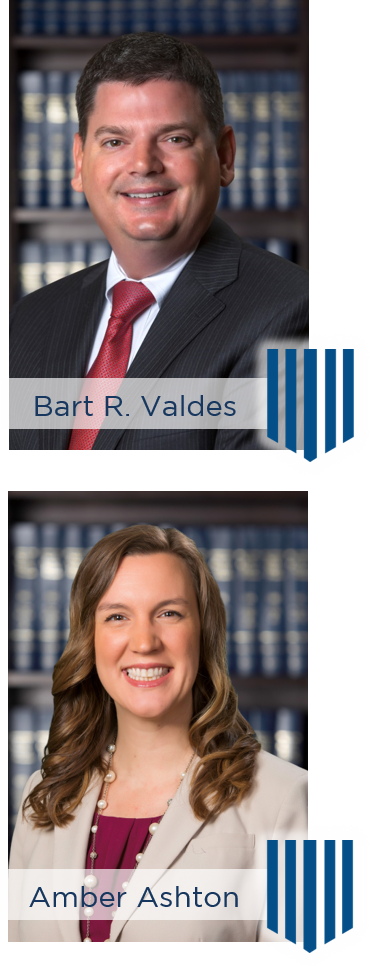Dealing with Association Liens and Code Enforcement Liens in a Foreclosure Action
 By Bart R. Valdes, Esq., and Amber Ashton, Esq.
By Bart R. Valdes, Esq., and Amber Ashton, Esq.
As Florida continues to sift through debris left in the wake of the foreclosure crisis there are some issues that remain even after a property is sold at a foreclosure sale. Both homeowners’ and condominium associations, as well as local governments, often end up with liens that need to be dealt with after a foreclosure action. The ability to resolve these issues promptly and fairly is important to all parties involved.
In Florida, the Homeowners’ Association (“HOA”), §720.3085, Florida Statutes, and Condominium Owners’ Association (“COA”), §718.116, Florida Statutes, lien laws operate in substantially the same manner. In many instances, the liability of a first mortgagee (the “lender”) is limited, or completely extinguished, by the documents that govern the HOA or COA (often called the “declaration” or “covenants”). Also, the HOA/COA’s right to collect from a first mortgagee may depend on when the mortgage was executed. It is, therefore, critical to review the governing documents of the HOA/COA, as well as the applicable loan documents, to determine the rights of everyone involved.
There is also a statute that limits the liability of the first mortgagee (or its successors and assigns) in certain instances. So long as the first mortgagee names the HOA/COA as a party in the underlying foreclosure action, the HOA/COA is limited in its ability to pursue assessments which accrued on the property prior to the conclusion of a successful foreclosure action. In instances where the statute applies, the HOA/COA may only recover from the lender the lesser of:
(1) the unpaid assessments for the 12 month period immediately proceeding the mortgagee’s acquisition of title; OR[1]
(2) one percent (1%) of the original mortgage debt.
Importantly, the lender will be responsible for any and all assessments which come due after the recording of the Certificate of Title in favor of the lender. As a general matter, the lender is responsible for paying the amount due for prior assessments to the COA within thirty (30) days of acquiring title or the property may be subject to a Claim of Lien for the assessments due. In regard to HOA assessments, the assessments are due as provided in the individual HOA governing documents. The HOA has to provide forty-five (45) days written notice to the owner prior to recording a lien for unpaid assessments. Both the COA and HOA statutes provide for the payment of interest and attorneys’ fees for unpaid assessments after title is acquired.
In order to expedite this process, Florida law states that within fifteen (15) days of a written request from an owner or lender, or their designee, a HOA/COA must provide an “Estoppel Certificate” signed by an officer or authorized agent of the HOA/COA stating all assessments and other monies due to the HOA/COA. The HOA/COA may charge a reasonable fee for the preparation of the Estoppel Certificate so long as the fee is provided for in the HOA/COA governing documents. If the HOA/COA does not provide the Estoppel Certificate then there is an expedited suit that can be filed, or a post-judgment motion may be pursued, to determine the amount of assessments due and assist in clearing title.
The other most common type of lien that arises out of a foreclosure action is a code enforcement lien. Code enforcement violations generally occur simultaneously with a lender’s foreclosure efforts due to either the abandonment of the property by the owner/investor, the neglect of the tenant or occupant while a property is in foreclosure, or active attempts by the owner to impair the property value.
When a code enforcement lien is discovered, it is important to first check to see when the Notice of Lis Pendens was recorded. The recording of the Notice of Lis Pendens in the foreclosure suit operates to protect the lender’s interest in the property from any impairment from intervening liens, including code enforcement liens. Medical Facilities Development, Inc. v. Little Arch Creek Properties, Inc., 675 So. 2d 915 (Fla. 1996); Chiusolo v. Kennedy, 614 So. 2d 491 (Fla. 1993). Under most circumstances, the recording of the Notice of Lis Pendens also constitutes a bar to the enforcement against the property of the code enforcement liens. §48.23(1)(d), Fla. Stat. (2009). Further, as a general rule, once the property is sold at a judicial sale, the property is forever discharged from the alleged liens. Op. Att’y Gen. Fla. 93-77 (1993). As such, there may be certain legal defenses to code enforcement liens that are available to those who end up with a property after a foreclosure sale.
Most cities and counties also have “amnesty” programs available to provide a fine or lien reduction even if the legal defenses above are not present. Usually, the county or city will require the new owner to take the corrective action required by the code enforcement department before the lien is reduced or eliminated. Every case needs to be evaluated independently as there are many variables that impact the decision making on how to deal with these liens. Either way, it is important to have competent legal counsel to assist in promptly resolving these issues in order to clear title and preserve the value of the property.
[1] The law changed in July of 2010, to cover the previous twelve (12) months. For properties that were acquired prior to July, 2010, the liability was only for the past six (6) months.
 Payment Center
Payment Center

